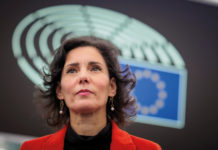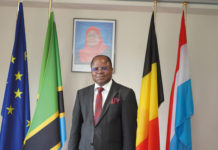Economic Outlook
Rwanda is a small and landlocked East African country bordered by the RDC, Tanzania, Uganda and Burundi. The economic growth of the country for the past decade has been made possible thanks to important economic and structural supported by the IMF and the World Bank. Rwanda was in the middle of an economic boom before the COVID-19 pandemic, with an averaged 7.2% growth over the decade and a growth of 9.4% in 2019, mainly driven by large public investments in the sub-sectors of construction, wood and paper products, rubber and plastics. All sectors recorded growth in 2019, agriculture accounted for 24% of the GDP, industry for 18% and the services for 49%.
In 2020, the GDP growth is estimated to have dropped to 0.4%, but is expected to grow to 5.1% in 2021, 7.0% in 2022 and an average of 7.8% in 2023/24, driven by the same sectors that were the source of the pre-pandemic growth. The most affected sectors are transportation, trade and tourism, but foreign investments and exports were also impacted. Inflation grew from 2.4% in 2019 to 6.6% in 2020 due to rising food prices caused by disruptions. Unemployment rose by over 5% since the beginning of the pandemic.
The public debt rose from 45% of GDP in 2018 to 51.4% in 2019 and 61.6% in 2020. It is 80% external, with two-thirds held by multilateral donors and the rest is shared equally among commercial creditors, bilaterals and guarantees held by state-owned enterprises. The IMF raised the risk of debt distress from low to moderate in June 2020. Rwanda’s trade balance has been continuously in deficit for the past 15 years, with a balance rising from USD – 200 million in 2002 to USD – 1.5 billion in 2019.
The IMF’s loosening of the country’s public deficit target should facilitate continued public investment. In 2019, the IMF agreed to the establishment of a non-funding program (Policy Coordination Instrument), which was accompanied by a relaxation of the budget deficit target from 3.0% to 5.5% of GDP for 5 years renewable. This flexibility should allow for additional funding for major projects, education and health.
Despite the crisis, the banking sector remains liquid and well capitalized, with a Liquidity Coverage Ratio of 252.8% (June 2020).
Because of the country’s geography, most imports and exports are transported by road through the ports of Mombasa (Kenya) and Dar es Salaam (Tanzania), over up to 1,500 km. The country’s isolation, exacerbated by the high cost of infrastructure (the most expensive electricity in East Africa) and the poor quality of roads, limit the possibility of Rwanda’s aim to become a technological, financial and business hub and a pivot between East and West Africa. The country aims to become an upper-middle income country by 2035 and then a high-income country by 2050.
On the political side, the country has been stable since the 1994 genocide against the Tutsi and the accession to power of President Paul Kagame and the Rwandan Patriotic Front, which still has the absolute majority in the Chamber of Deputies. In 2018, for the first time, two opposition parties have won two seats each in the parliament. President Kagame was re-elected for a third term thanks to a constitutional change voted in 2015 that would permit him to govern until 2034.
Foreign Investment
Rwanda is a member of the East African Community, which uses the East African Community Customs Act (EACMA) to collect import duties. The EACMA common external tariff system for goods originating outside the customs union provides for three rates of duty: 0% for raw materials and capital goods, 10% for intermediate goods and 25% for finished goods.
Taxation levels:
- VAT: 18%
- Corporate income tax: 30%
- Withholding tax on foreign products: 5%
- Withholding tax on public tenders: 3%
- Customs duties:
- Raw materials and capital goods (plants and machinery): 0%
- Intermediate goods: 10%
- Finished goods: 25%
According to the World Bank, low domestic savings, skills, and the high cost of energy are some of the major constraints to private investment. According to UNCTAD, inflows increased from USD 382 million in 2018 to USD 420 million in 2019, mainly in the sectors of mining, construction and real estate, infrastructure and information and communication technologies. The FDI stock was estimated at USD 2.6 billion at the end of 2019.The Bugesera International Airport construction project alone absorbed USD 400 million.
With the aim to attract more FDI, the government approved in 2015 a new Investment Code providing tax breaks and other incentives to investors. Furthermore, all economic activities are open to foreign investors, who have the same rights as domestic investors to establish and own businesses in the country and there are no general limits on foreign ownership or control.
Rwanda is ranked 38th (out of 190) at the Doing Business ranking, 49th (out of 180) at the Corruption Perceptions Index, 160th (out of 189) at Human Development Index. Rwanda remains the second highest ranked country at the DB ranking in Africa after Mauritius, and the only low-income country in the top 50, despite the 9 places drop between 2019 and 2020. It performs well in transferring property (3rd) and obtaining loans (4th). However, while the legislative framework seems optimized for this ranking, serious difficulties remain, such as obtaining a work visa for foreign workers, the lack of competence of the tax authority’s middle management (poor and lengthy audits) and the very low quality of the local workforce.
Nevertheless, Rwanda offers many opportunities to investors such as a large methane reserve and an expanding mining potential (cassiterite, coltan, gold and precious stones) yet to be fully explored. It is also one of the least corrupt countries in Africa and the government has continuously developed liberal policies to transform the country into a hub of trade and services. This strategy included the construction in Kigali of new international business class hotels, a new inland container terminal, a convention center and a bonded warehouse. The construction of the new Bugesera International Airport is also part of the government’s plans of modernization.
Belgium and Rwanda
In 2020, Rwanda was Belgium’s 106th client and 138th supplier. They imported mainly chemicals (41.2%), machinery and equipment (14.7%) and live animals (7.2%), and exported mainly vegetables products (70.3%), textiles (23.5%) and fat and oils (4.7%) to Belgium. The trade balance was in favor of Belgium for 60.6 million €. In 2019, 640 Belgian companies exported to Rwanda.
Leading Sectors
- Infrastructure
- Energy
- Agriculture
- Tourism
- Manufacturing
- ICT
- Mining
- Financial services
- Real estate
- Construction
Sectors of Interest
Agriculture and agribusiness
Agriculture is one of the most important sectors in Rwanda’s economy, employing over 70% of the population and contributing to around 30% of GDP growth. It is a priority sector in Rwanda’s Vision 2050 national development strategy. The country’s ideal climate, fertile soil and a large labor force is perfect for the horticultural sector. In recent years, the sector has experienced significant growth of 4.5% to 6% per year and is gradually moving from a subsistence to a market-driven model. In 2019, food crops were the dominant sub-sector, accounting for 58% of the sector in terms of contribution to GDP, followed by forestry 21%, livestock 12%, traditional export crops 7% and fisheries 1%. Principal exports are coffee, tea and some value-added agricultural products such as canned tomatoes, macadamia nuts, honey, etc.
The production of food and cash crops have been steadily increasing in recent years and it is expected to keep growing. It can be linked to the crop intensification program launched in 2007, which aims to increase agricultural productivity in high potential food crops.
Promising sub-sectors in agriculture:
- Cereal industry
- Irrigation
- Mechanization and agricultural machinery
- Industrial crops
- Quality fertilizers
- Support for commercial and small-scale farmers
The development of the agricultural sector is accompanied by the growth of the food processing industry for the domestic market, stimulating the sales of agribusiness’ equipment. Rwanda’s food exports are expected to shift towards more processed products, generating more value added. The existence of free trade zones and agreements at the regional and continental levels facilitates the access to the national market for foreign companies. Belgium is Rwanda’s first supplier of agribusiness equipment, followed by China and India.
The beverage sub-sector continues to be dominant in Rwanda with revenues exceeding USD 190 million in 2019. Most of the production is for local consumption.
The beverage sector includes companies such as Braliirwa (market leader and subsidiary of Heineken), Brasseries des Mille Collines (UNIBRA) or Inyange industries.
Promising sub-sectors in agribusiness:
- Cold chain equipment – Refrigerated trucks, cold chambers etc.
- Equipment for the beverage industry (excluding wines and spirits)
- Equipment for the bakery, pastry and confectionery industry
- Equipment for the dairy industry
- Machinery for the preparation and processing of meat and poultry
Energy
Access to electricity varies between 35% in rural areas and close to 100% in urban areas, with about half of the population connected. The country has access to large natural energy resources (hydro, solar and methane gas). To achieve the goal of becoming a middle-income country, Rwanda targets universal access to electricity by 2024, through a mix of on-grid and off-grid connections. According to the national development agency of Rwanda, 51% of the investments were made in the energy sector in 2019.
To position itself as a service hub for the region, the government agreed to numerous power purchase agreements with independent power producers. They also want to improve the grid network to avoid losses and to connect with neighboring countries, to import and export power.
To attract private companies in the energy sector, the government implemented some measures:
Provision of an investment certificate
- A variety of non-tax and tax incentives:
- Tax exemption including VAT on the import of equipment, free repatriation of profits
- Preferential corporate income tax rate of 15%
- Tax exemption on corporate income for seven years for energy projects producing 25 MW with an investment of US$ 50 million
- Provision by RDB of assistance to registered investors
The government has also put in place significant facilitation for private sector investment to ensure their participation in the energy sector:
- Power Purchase Agreements between EUCL and Independent Power Producers: minimum 25 years
- Legal framework established to stimulate PPPs (PPP Law established in 2016)
- Renewable Energy Fund to support the development of off-grid and clean cooking technologies:
- Financial assistance
- Results Based Financing
- Technical assistance to private companies and consumer awareness campaigns
Promising investment opportunities:
- Power transmission and distribution equipment and services
- Off-grid energy solutions, such as rooftop solar products and solar powered irrigation
- Technical assistance and services
Mining and minerals
The mining sector is the second largest source of export revenue after tourism. It is one of the world’s biggest producer of the 3Ts (tin, tantalum and tungsten) and also exports gold and gemstones. The country wants to develop the sector by intensifying mining, but also by expanding and improving its finished and semi-finished processing industry of mineral products. To do so, the government wants to formalize the sector (around 80% of the country’s output is from small-scale mining) and attract international investors.
The Rwanda Mining, Petroleum and Gas Board founded in 2017 oversees regulation and mining licensing. It identified investment opportunities in the entire value chain from exploration to value addition.
Promising investment opportunities:
- Mineral exploration
- Mining equipment and services
- Processing plant
- Gemstones cutting and polishing
ICT
Rwanda is one of the fastest growing African countries in ICT and the sector grew by 29% in 2020. It is one of the few sectors recording a positive growth during the pandemic, with the increasing use of mobile money, credit and debit card. The government aims to provide internet access to the entire population. It has already installed over 5000 km of fiber optic cables and has built a national high-speed 4G wireless broadband network.
The cell phone operator MTN Rwanda was listed on the Rwanda Stock Exchange in May of this year and is opening to new shareholders.
Promising investment opportunities:
- E-commerce and E-services
- SMART energy grid
- Internet data centers
- Training of ICT professionals
- Software development
Sources:
African Development Bank
Belgian Foreign Trade Agency
BusinessFrance
FAO
International Trade Administration
Rwanda Development Board
Rwanda Mines, Petroleum and Gas Board
Rwanda Ministry of Infrastructure
Santander
The World Bank
Nicolas Stenger
Editor

Passionate about environmental and sustainable development concerns, I never miss an opportunity to analyze, understand and talk about the challenges of our time, everything related to the economic and social development of the South and the relationship between society and the environment.
Want to share your thoughts? Let’s meet on LinkedIn!
![[:en]Capture d’écran 2021-07-19 à 16.56.07[:]](https://perspectives-cblacp.eu/wp-content/uploads/2021/07/Capture-décran-2021-07-19-à-16.56.07-696x463.png)


